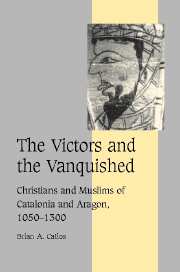Book contents
- Frontmatter
- Contents
- List of figures
- List of maps
- List of tables
- Acknowledgments
- Note on the citation of sources, dates, places, and names
- Glossary
- List of abbreviations
- INTRODUCTION
- Part I Muslim domination of the Ebro and its demise, 700–1200
- Part II Muslims under Christian rule
- INTRODUCTION
- 3 THE FINANCIAL AND JUDICIAL ADMINISTRATION OF MUDÉJAR SOCIETY
- 4 MUSLIMS IN THE ECONOMY OF THE CHRISTIAN EBRO
- 5 MUDÉJAR ETHNICITY AND CHRISTIAN SOCIETY
- 6 MUSLIMS AND CHRISTIAN SOCIETY
- MUDEJARISMO AS A SOCIAL SYSTEM
- Part III INDIVIDUAL AND COMMUNITY IN THE CHRISTIAN EBRO
- Conclusions
- Appendices
- Select bibliography
- Index
- Cambridge Studies in Medieval Life and Thought Fourth series
3 - THE FINANCIAL AND JUDICIAL ADMINISTRATION OF MUDÉJAR SOCIETY
Published online by Cambridge University Press: 08 January 2010
- Frontmatter
- Contents
- List of figures
- List of maps
- List of tables
- Acknowledgments
- Note on the citation of sources, dates, places, and names
- Glossary
- List of abbreviations
- INTRODUCTION
- Part I Muslim domination of the Ebro and its demise, 700–1200
- Part II Muslims under Christian rule
- INTRODUCTION
- 3 THE FINANCIAL AND JUDICIAL ADMINISTRATION OF MUDÉJAR SOCIETY
- 4 MUSLIMS IN THE ECONOMY OF THE CHRISTIAN EBRO
- 5 MUDÉJAR ETHNICITY AND CHRISTIAN SOCIETY
- 6 MUSLIMS AND CHRISTIAN SOCIETY
- MUDEJARISMO AS A SOCIAL SYSTEM
- Part III INDIVIDUAL AND COMMUNITY IN THE CHRISTIAN EBRO
- Conclusions
- Appendices
- Select bibliography
- Index
- Cambridge Studies in Medieval Life and Thought Fourth series
Summary
The nature of the surviving archival documentation has contributed to a traditional emphasis on mudejarismo as principally a judicial, and secondarily a fiscal, phenomenon. The legal statutes of the medieval Crown emphasize the special character of Muslims and Jews as subject through a limited maintenance of their own judicial traditions and legal apparatus and the formal constitution of semi-autonomous local administrations (aljamas), to the presence of laws which limited their participation in Christian society and rights before Christian justice. This trend has contributed to a vision of mudéjares as comprising a community set apart from the dominant Christian nation with which it coexisted, at best, as a separate solitude or, at worst, as an oppressed out-caste. Toleration of the presence of a Muslim minority within the Crown has been conceived of for the most part, and perhaps not incorrectly, as a matter of economic expediency. Mudéjares were tax-payers and producers, valued for their ability to provide funds to lay and ecclesiastical lords, and most importantly, to the royal treasury.
Hence, in fiscal matters too, the mudéjar has been conceived of largely as a marginal, passive participant in the politico-economic complex – in essence, an object of exploitation (as if the same could not also be said of the overwhelming bulk of the Christian population). In reality, the boundaries between Christian and Muslim communities were not as clear as the legal and fiscal documentation might lead one to believe.
- Type
- Chapter
- Information
- The Victors and the VanquishedChristians and Muslims of Catalonia and Aragon, 1050–1300, pp. 125 - 178Publisher: Cambridge University PressPrint publication year: 2004



